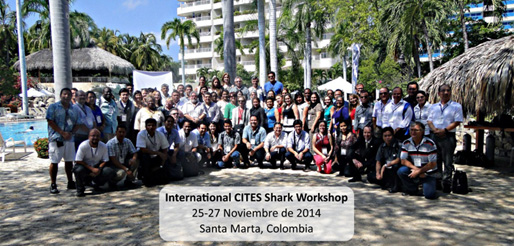CITES Calendar
| Título | Venue & Date | Detalles |
|---|---|---|
| General Fisheries Commission for the Mediterranean (GFCM) - 2nd Workshop on the Conservation of Elasmobranchs in the Mediterranean and the Black Sea | Sete, France 10 - 12 Diciembre 2014 |
|
| Reunión del Grupo de expertos de la UNODC sobre Directrices para métodos y procedimientos de laboratorio forenses para la identificación y el análisis de maderas | Vienna, Austria 10 - 12 Diciembre 2014 |
|
| Reunión del Grupo de trabajo sobre ordenación de la pesca de la Comisión Regional de Pesca (COREPESCA) para Oriente Medio | Cairo, Egipto 09 - 11 Diciembre 2014 |
|
| Octava sesión de la Comisión Regional de Pesca (RECOFI) | Cairo, Egipto 08 - 10 Diciembre 2014 |
|
| Integrating environmental sustainability into the Sustainable Development Goals and Post 2015 Agenda Senior Expert Meeting on “Integrated measures for monitoring” | Gland, Suiza 03 - 05 Diciembre 2014 |
|
| IKM Initiative Working Meeting of the development of a Thesaurus | Bonn, Germany 01 - 02 Diciembre 2014 |
|
| Décimo primera sesión regular de la Comisión de Pesca del Pacífico Central y Occidental (WCPFC) | Apia, Samoa 01 - 05 Diciembre 2014 |
|
| International Workshop on the Prohibition of the Illicit Trade of Wildlife | Tagaytay City, Philippines 27 - 28 Noviembre 2014 |
|
| International CITES Sharks workshop: Articulating experiences and strategies for the implementation of the listing of species included in Appendix II | Hotel Irotama, Santa Marta, Colombia 25 - 27 Noviembre 2014 |
Meeting summary Santa Marta, Colombia, 27 November 2014 - More than 60 participants, representing over 20 countries, came from across the globe to Santa Marta, Colombia, from 25 to 27 November to participate in a workshop focused on the implementation of measures regulating the international trade in five shark species that were adopted at the last meeting of the Conference of the Parties of the Convention on International Trade in Endangered Species of Wild Fauna and Flora (CITES) held in Bangkok in 2013. The workshop, which was hosted by the Government of Colombia with the generous support of the United States and the CITES Secretariat and technical assistance from Pew Charitable Trusts, Humane Society International, Defenders of Wildlife and Conservation International, identified actions needed to monitor and control the trade of CITES-listed shark products; and develop the strategies for making a sustainability finding required under CITES (referred to as a “Non-Detriment Finding”). At the workshop, CITES authorities and fisheries agencies, customs officials, and other experts came together to discuss mechanisms for control in the trade of CITES-listed shark species and the process for making a Non-Detriment Findings within the context of shared international experiences and case studies from different parts of the world. “This workshop gathered for the first time CITES administrative and scientific authorities, fisheries authorities and custom authorities from each country, in order to undertake an integral analysis at regional and international levels, but also with the scope of proposing strategies for the improvement of the management of these species worldwide”, said the Vice minister of Environment and Sustainable Development of Colombia, Mr. Pablo Vieira. The Head for Marine and Coastal Affairs and Aquatic Resources from the Ministry of Environment and Sustainable Development of Colombia highlighted that “this workshop is the continuation of the efforts of several countries and organizations aimed at strengthening the capacities of all CITES Parties in order to demonstrate that the implementation of CITES measures for the shark species listed in Appendix II at COP16 is possible”. CITES Secretary-General John E. Scanlon applauded the leadership shown by the government of Colombia. “Since the decision to apply CITES controls to international trade in products of five species of sharks and all manta rays in 2013, there has been an extraordinary worldwide effort to develop and expand the capacity to make these controls effective” he said. “The workshop in Santa Marta, Colombia is a major milestone in this global collective effort” he added. "These listings, which brought commercially exploited marine species under the protection of CITES, were a turning point for both the treaty and shark and ray conservation," said Bryan Arroyo, Assistant Director of the U.S. Fish & Wildlife Service International Affairs Program. "The United States strongly supported the adoption of these listings and we are committed to working with industries, foreign governments, the CITES Secretariat, and other partners, to ensure their effective implementation." In addition to shark identification, the workshop in Colombia provided presentations and discussion of how countries are working towards enhanced traceability of shark products in trade, the role of tariff codes in facilitating trade monitoring, and control of CITES-listed species through regulatory and enforcement tools. "Sharks are migratory species, so collaboration between and within countries is essential. We believe this workshop will inspire enhanced collaboration between fisheries and CITES authorities and are proud to be partnering with the Government of Colombia on this important workshop," concluded Angela Somma, Chief, Endangered Species Division of the U.S. National Marine Fisheries Service. The objective of the workshop was to assess the monitoring and control mechanisms necessary to ensure the traceability of international trade in the sub-products (fins and meat) of shark species listed in CITES Appendix II, and to define strategies for the development of non-detriment findings for newly listed-species.
> For more information and the agenda of the workshop, please click here > Presentations given at the workshop: 4b - Defenders of Wildlife (E) 5 - Brasil (E) 6 - Guatemala (S) 7 - Alemania (S) 8 - Ecuador (S) 9 - Colombia (S) 10 - Hong Kong (S) 12 - NDF (E) 12a - NDF (S) 14 - Case study Scalloped Hammerhead Shark Mexico (E)
* S = Spanish, E = English
|
| Reuniones anuales del Comité encargado de la observancia y hacer cumplir las leyes en materia medioambiental de INTERPOL | Lyon, Francia 25 - 27 Noviembre 2014 |
